At the outset of the “listening session” in Vancouver yesterday, Congressman John Mica tried to make it clear that he wanted specifics. Unfortunately not everyone got the message. Mica, a Republican from Florida, is Chairman of the powerful House Committee on Transportation and Infrastructure that is tasked with re-writing our nation’s transportation law. He’s currently on a national tour of field hearings to solicit feedback from local transportation officials and citizens.
In his opening remarks, Mica told the overflow crowd of about 120 people (with at least twice that many waiting outside), that he didn’t want to debate specific local or regional projects. “That is not the purpose of this meeting,” he said, “We’re not going to entertain specific project recommendations.” The purpose of the meeting was only to “solicit ideas on how we can craft legislation.” Mentioning specific projects was meaningless, Mica told the crowd, since Congress is “not taking earmarks.” The projects instead, he said, will be set by policy, “And you have the opportunity today to help us in that regard.”
Before handing the mic over to his colleagues, Mica said something that should please active transportation and transit advocates.
“We’re under the sixth extension of the highway, as it’s sometimes referred to, or transportation bill, which would be more accurate since it’s a multi-modal policy setting bill.”
Sitting around Mica were fellow members of Congress and a host of regional transportation bigwigs. Senior member of the House T & I Committee Peter DeFazio (D-OR) was there, as were other members of the committee Jamie Herrera Beutler (R-WA), and Bill Shuster (R-PA). The panel also included WashDOT rep Don Wagner, WashDOT Secretary Paula Hammond, Chandra Brown from Oregon Iron Works, Clark County Public Works Director Peter Capell, a rep from Associated General Contractors, and others.
Despite Mica’s calls to not discuss specific projects, a large portion of the hearing was devoted to discussing the Columbia River Crossing project. Other major themes of the meeting were jobs creation, the impact of environmental regulations on project timelines, the pros and cons (thanks to Rep. DeFazio) of public private partnerships as a revenue stream, more local control of project decisions, and how to “do more with less.”
To set the stage for the discussion, Congressman DeFazio painted a dire picture of the state of our nation’s transportation system. 150,000 bridges need “significant” rehabilitation or replacement, 40% of pavement on our highway system needs to be reconstructed, and we’re so behind on transit spending, DeFazio said, our systems are deadly:
“We have a $60 billion backlog on transit investment. It’s gotten so bad we’re killing people with the existing system; like in Washington D.C. on Metro where cars are so outmoded they put the ones that don’t work anymore in the middle with cars on either end hoping the whole thing might work and sometimes it doesn’t and people have died.”
As for what’s likely to be in the new transportation reauthorization, DeFazio said they’re estimating $260 billion (with existing revenues) over six years. That’s not nearly enough, DeFazio said, since a bi-partisan task force estimated we need $460 billion just to maintain the current system.
“We are not spending near enough money to maintain the current, deteriorating state of infrastructure in America let alone meet our future, 21st century needs.”
DeFazio also shared a bit of a zinger about the estimated $4 billion cost of the Columbia River Crossing. He recounted a trip to France where he and Rep. Mica got a tour of a “state of the art” bridge that was built for $800 million. When people come to his office to talk about the CRC, he said, “I say go online, look up that bridge and then tell me how it’s going to cost $4 billion to go over the Columbia River!” “I’m pleased,” DeFazio said, “that both our governors have recently said, let’s step back from this and look at the reality of the design and other elements.”
It’s rare for a member of Congress — especially a ranking member of a committee that sets funding policy — to share such a clear opinion on the controversial CRC project.
About the challenge ahead, DeFazio turned to Mica and said, “John has a tremendous challenge because, how are we going to squeeze $460 billion of investment out of $260 billion in existing revenue? We’re going to do things differently. I still think we need some new revenues, but that, for the moment, is off the table.”
By “new revenues,” DeFazio was making a veiled reference to raising the gas tax, an idea that Chairman Mica has said is “off the table.”
Another member of the House T & I Committee, Congressman Bill Shuster, prefaced his remarks by saying he’s “a conservative Republican” but that it’s okay for the government to be involved with infrastructure investment because it’s in the constitution (Article I). As for how the government should pay for infrastructure, Shuster said they’re not able to raise the gas tax because, “The will of the American people is not there to support it.” Instead of charging at the pump to raise revenues, Shuster proposed public-private partnerships (“getting the private sector involved”) and tolling.
The first invited panelist to speak was Washington DOT Secretary Paula Hammond. Mica warned speakers to not talk from prepared statements, but she still delved right into a speech. A few minutes into her remarks, Mica actually cut her off. “Madame Secretary, let me tell you, put that away.” he implored, “Tell us some specifics, what do you want to see in or out of this law?”
Hammond went on to say that her agency is smarter these days and that instead of just adding capacity when highways fill up, they are doing, “not more with less, more strategic with less.” “We use every inch of pavement we have.” She also spoke of managing demand through tolls and she gave a big push for transit and the importance of the Amtrak Cascades line.
Hammond wasn’t the only speaker Mica cut off. Michael Ennis, Director of the Center for Transportation at the Washington Policy Center and Larry Paulson, Executive Director of the Port of Vancouver, and Clark County Director of Public Works Peter Cappel were all called out by Mica to cut to the chase and offer clear specifics about what they’d like to see in the new transportation bill.
Even though some speakers had a hard time focusing on specifics and much of the hearing was gobbled up by the CRC project, there were suggestions offered to Mica and the other members. It was even a bit refreshing to see DeFazio and Mica scribbling notes as people spoke.
There was a lot of discussion about how EPA regulations and environmental mitigation in general has become “extremely onerous” (as both Cappel and Hammond put it) on project timelines. Joe Correy, a rep from Associated General Contractors said, “We need less regulations.” Cappel from Clark County Public Works said EPA regulations are, “One of the biggest challenges” he faces. Several panelists spoke to how environmental mitigation requirements result in skyrocketing project costs.
Rep. Shuster spoke of his work in the Northeast part of the country. “We faced bats, snails, fish, trees, you name it, we faced it… Everyone is concerned about the environment, but we’ve got to find the right balance.”
The best point made about that topic came from Chandra Brown of Oregon Iron Works. Her company is fueling the made in America streetcar boom. She spoke about how her rail projects must submit environmental impact statements even though they use existing right-of-way and “They’re just rails in the street!” Brown also suggested making economic development a criteria for funding transportation projects.
In the end, this hearing made almost no progress on the largest question facing legislators: revenue. Besides a few quick mentions of tolls (which are just marginally more politically feasible than gas tax increases), public-private partnerships were the only real revenue-generating policy that was discussed; but even Rep. DeFazio described in detail how even those, “Are no magic bullet.”
Without a clear new revenue stream, and with a gas tax increase being a taboo subject, the future still looks very murky. DeFazio made it clear in his opening remarks when he looked to Rep. Mica and said,
“John has a tremendous challenge, because, how are we going to squeeze $460 billion of invesment of $260 billion? We’re going to do things differently… I still think we need some new revenues, but that, for the moment is off the table.”
Unfortunately, Rep. Mica only left a few minutes at the end of the hearing for citizen input. Only about five people got a chance to speak (read more about what wasn’t heard at the hearing in our story from yesterday).
Oh, and in case you’re wondering, bicycling wasn’t mentioned at all. Not once.
UPDATE: Thanks to commenter Chris below… Here’s the link to full video of the hearing.

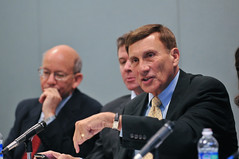
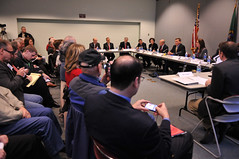
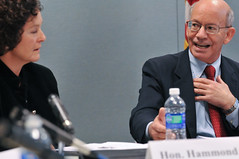
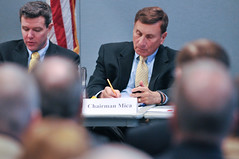
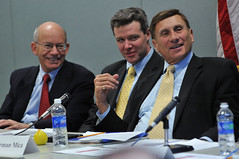
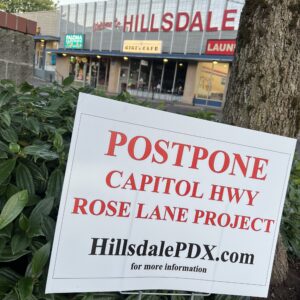

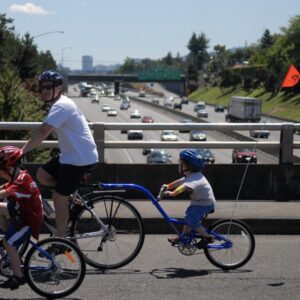
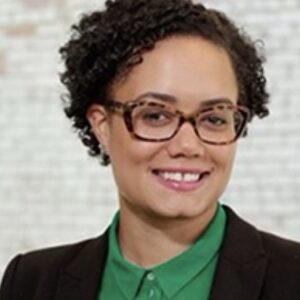
outstanding report. Thank you very much for that.
Thanks, Jonathan for the excellent reporting – no surprise that cycling wasn’t mentioned, but still a disappointment.
Do you know that Pete DeFazio has his own Max car? It is Number 204.
Great coverage and photos, Jonathan!
If anyone is interested, video of the hearing is now up on CVTV.org:
http://www.cityofvancouver.us/cvtv/cvtvarchive2/Community_Events/2011_Events/Transportation_and_Infrastructure_Listening_Session_Part_1_2-21-11.wmv
America has to adjust to change; change is coming.
This change will take the form of higher energy costs all around and petrochemicals inparticular.
This change will take the form of lower standards of living for my generation and the next.
Most importantly this change will call into question all of our economic assumptions.
Most dissapointing is that for some the solution to change is to run in circles screaming “THE SKY IS FALLING!!” or cutting off the nose to spite the face.
“Everyone is concerned about the environment, but we’ve got to find the right balance.”
For every large highway project I have reviewed and commented on (including the Columbia River Crossing) the scope and mandate of existing environmental law requires that environmental impacts be- a best- partially avoided and mitigated. There are always environmental impacts that are not addressed or are deemed too costly to avoid or mitigate. So it looks very much to me like the “balance” Shuster and others are seeking will result an outcome that leaves future generations with even more unmitigated environmental degradation to our air, water, and wildlife. No thanks.
Transportation infrastructure for transit, bicycles and pedestrians combined with land-use planning that reduces the need for mobility is going to have a much smaller ecological footprint-locally and globally. This smarter, cheaper, greener approach is also much more likely to improve our health and wealth by expanding active transportation and reducing dependence of imported petroleum and combustion engines. We need these type of investments that will yield higher returns, socially, fiscally and environmentally, not monstrosities like the proposed Columbia River Crossing that require us to settle a “balance” that degrades local ecosystems and the multitude of services they support.
The highway planners keep whining about not having enough money to repair the existing system. However, every time there’s any hint of money being available, all they want to talk about is grandiose new projects. Everybody agrees that there is not enough gas tax revenue to maintain the existing roads and bridges so why do these morons keep trying to build more of them. It makes about as much sense as adding a room onto your house while not being able to afford to fix the leaking roof.
Figuring out exactly who it is that wants to keep on expanding infrastructure in the face of a situation where money to pay for maintaining existing infrastructure goes lacking… . Who is it really? That wants to continue this expansion?
There’s the faction that wants existing freeways widened and new ones created…and that wants to have lots more ag, forestry and otherwise open land out there in places like Washington and Clackamas counties, ‘ that’s not doing anything’ …converted to ‘urban reserves’, to provide more corporate expansion and residential suburbs. Are all of the people in that faction ‘highway planners’? Wouldn’t seem like they would be, but whoever they are, what name do they go by?
I love that French quote from a Republican! Let’s call it the freedom bridge! The CRC bridge estimate is 800 million. The 6 on/off interchanges are estimated at 1600 million. I bet France did not spend so much to widen 5 miles of FREEway. Really this project is about paving over Vancouver and North Portland. All that traffic will head south where there are only 2 lanes in each direction at the Rose Quarter. Total insanity. Where is our bull dog Earl Blumenauer? Ooops I forgot, he’s a lap dog.
I find it amazing that the public is considered unwilling to pay an extra 5 cents or so a gallon in gas taxes but we’ll happily stop to throw 2 bucks or what ever in a bucket on toll highways? That makes no sense. And the public/private partnerships are meant to turn a profit. Do we really want to turn our highways over to Wall Street to run? Because that’s what public/private partnerships mean.
Thank you for the report! Very interesting to hear what is being discussed at these hearings.
Although it is encouraging that Mica talked about a multi-modal bill, it isn’t clear that his vision of multi-modal fully embraces walking and bicycling, particularly since the non-motorized modes were not even mentioned.
If I had been there, and was able to make one quick point, it would have been on the importance of a Complete Streets policy that did include walking and bicycling as primary users of the transportation system.